#CS Major core;
Explore tagged Tumblr posts
Text
The Mystery of Aaravos The Banter Lodge
So, recently an account called "The Banter Lodge" has popped up. April 30th, to be precise. You've seen it. I've seen it. We've all seen it. On Twitter, posting various images in the TDP official style.
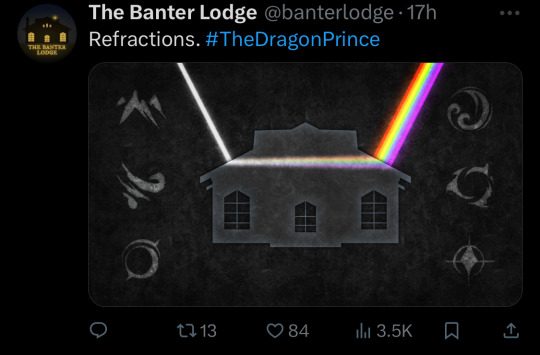
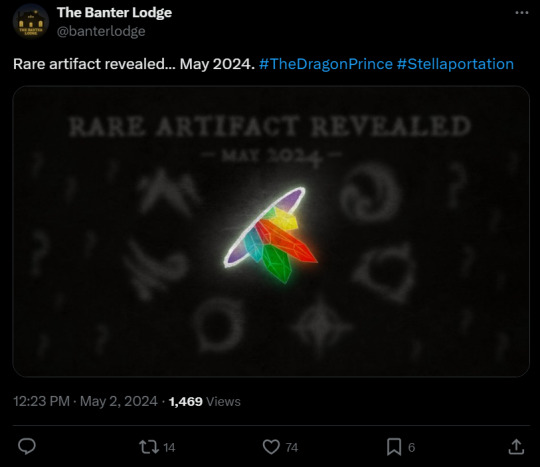
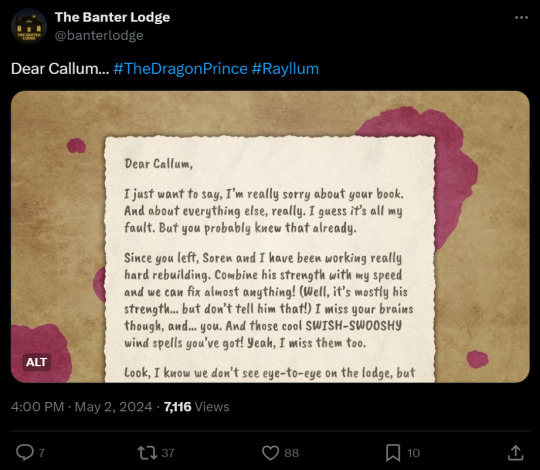

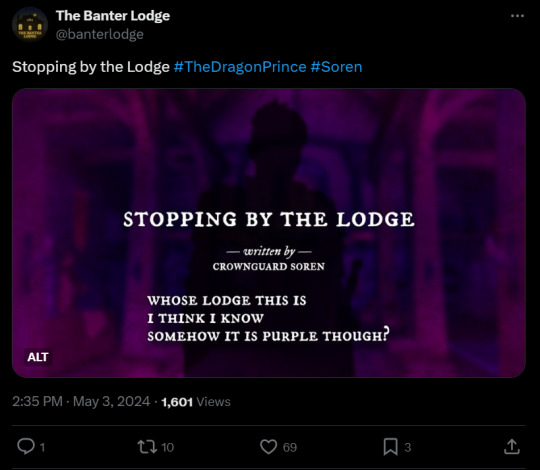
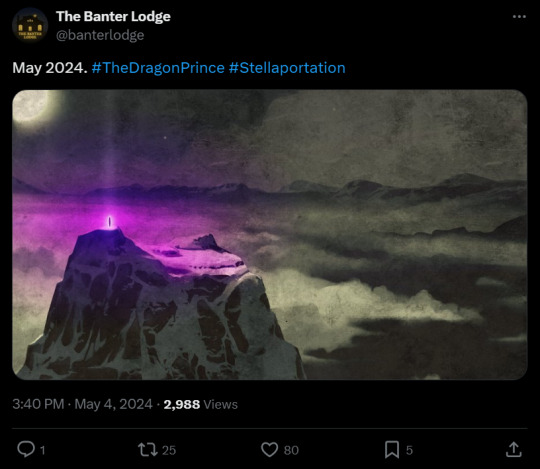
A few nights ago, it debuted on Tumblr as well. "Coming May 2024" all of the promotional images and the website itself say.
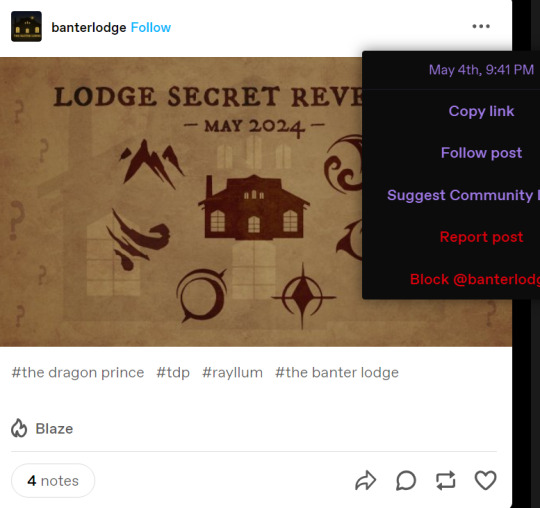


Who is this account? Is it fan made, is it official? It's May, when exactly in "May 2024" is it coming?
Well, me and a few friends took some time to try to piece the mystery together, and so -- while it may still be 'coming', only dropping hints, I am here to tell you what I know now!
History
Website Code ( I love computer programming so I took the time to dive into that!)
Purpose
A. History
Who's Running the Banter Lodge?
To know that, first we need to delve into the history of the Twitter account.
Despite these images and site debuting less than a month ago, the account itself was founded way back in 2022, and originally called @BantherLodge, with an H, as it is in the show.
@BantherLodge is no longer available, and while it initially did not seem to be connected to The Banter Lodge, there are several interactions linked to the current one, Banter Lodge without an H.
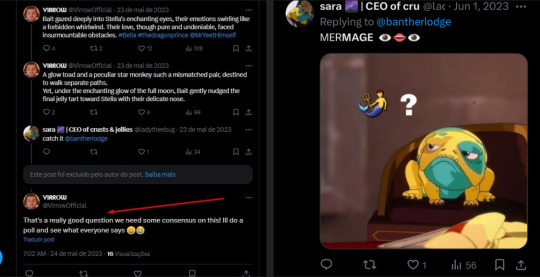
In fact, here is the same tweets linked to the current (banter) account version.

Now we've established that @'BantherLodge' and @'BanterLodge' the same account with a changed name and identity, here is the most important past interaction:
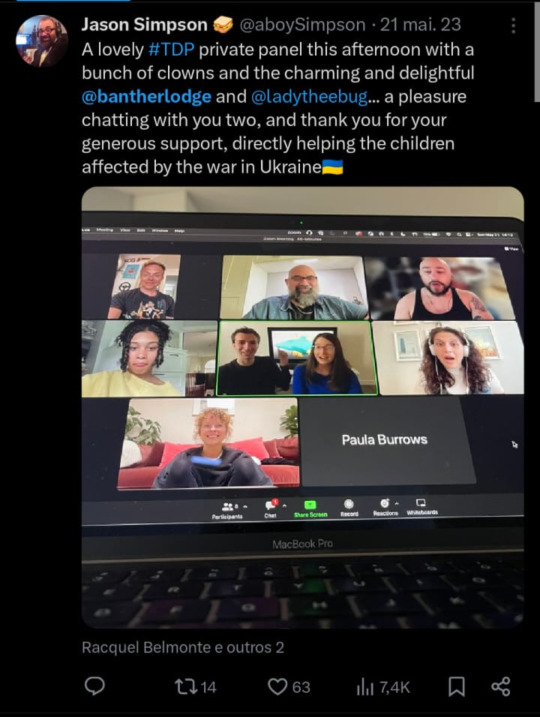
@‘bantherlodge’ is mentioned here, and they are on this call. that said, WHO IS REALLY BEHIND BANTER LODGE? well based off the tweet, it seems that it’s 6 members of the cast and then 2 guests, @‘thebantherlodge’ and @‘ladytheebug’. But don’t take my word for it. Here, more confirmation:
Another person in the call happened to tweet about it too, this time with labels.
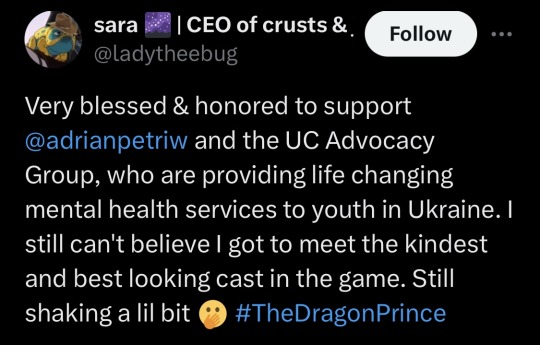
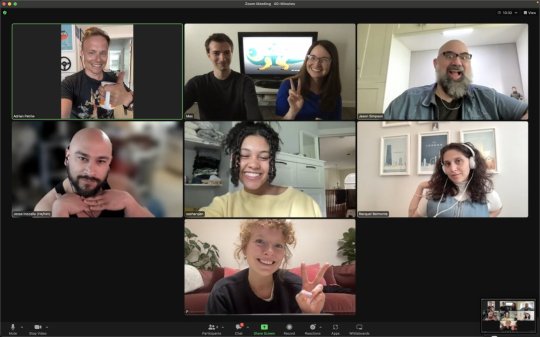
Now let’s take a closer look at these two guests. Sara @‘ladytheebug’ seems to be the one on the right, and by process of elimination, on the left is ‘bantherlodge’. aka:
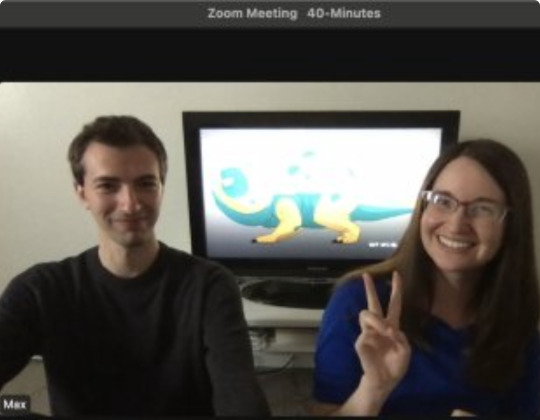
Max….
Max the Mystery! ‘Sara’ and ‘Max’ isn’t really enough information to know more along with no connection to other socials so it’s hard to pin down who they are or what connections to previous fandom projects or creative projects in general they might have. However, they are still connected.
Besides the partially deleted various back and forths between these two accounts, this tweet about the Bait screensaver in the background is additional confirmation that this is @‘bantherlodge’ and @‘ladytheebug’: (note use of word ‘our’)
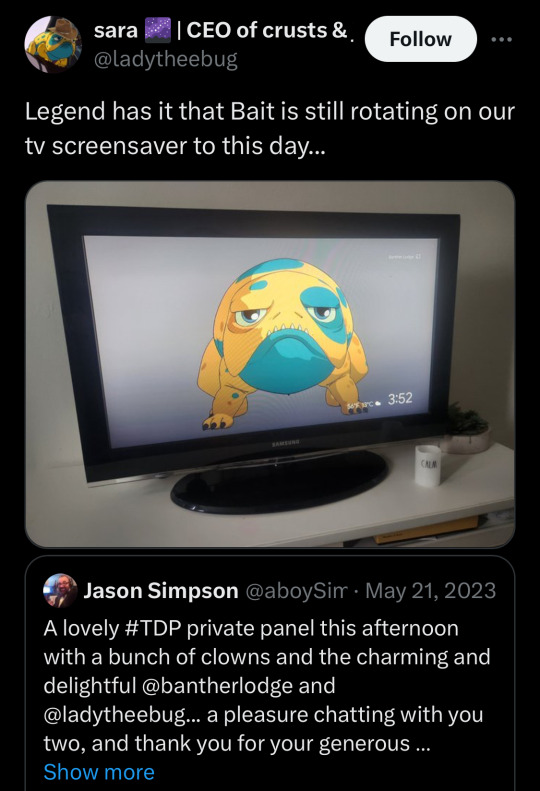
FURTHERMORE:

Said TV embodies this duo: A person who loves Bait (evident from so many of their tweets) and a person who loves the Banther Lodge…
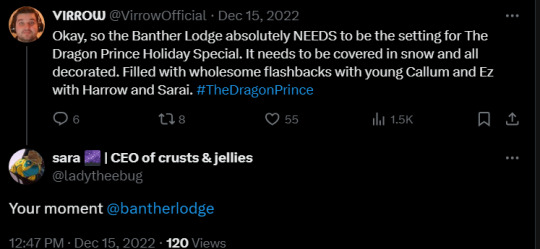
Reminds you of something, doesn’t it?

“but hold on, just because there’s all these coincidences doesn’t mean the account could be passed on to someone else to run this.” Ok, but one last thing. If that was the case, why would they still be following Sara? In fact, it’s the Only person that they’re following besides TDPO?
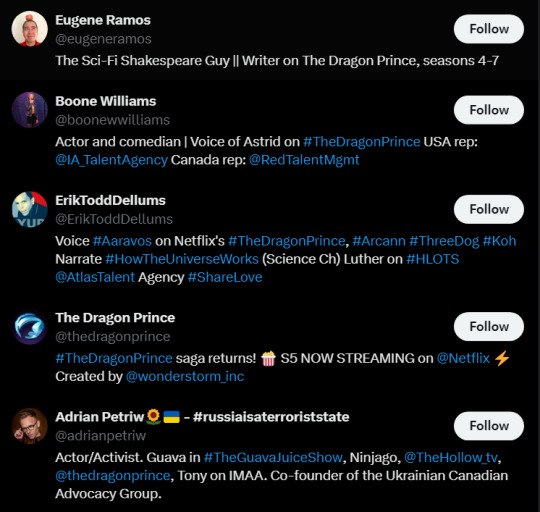
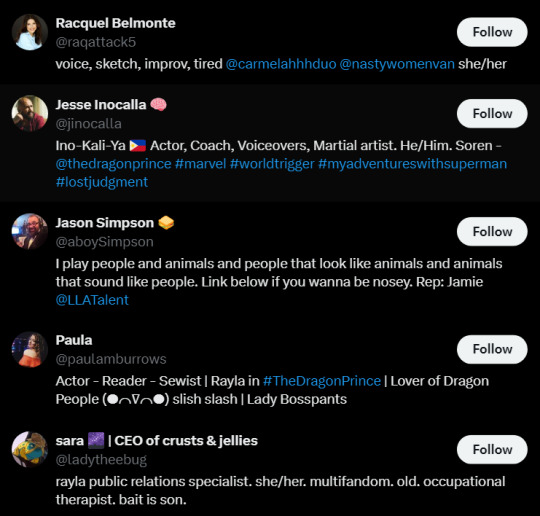
(and their following has even been recently updated within the last few days as before then it didn’t include Eugene and Boone.) So, in conclusion,
Max of @‘BantherLodge’, and possibly Sara, (with or without TDPO but I’ll get to that later) almost certainly are the people behind the curtain of this Banter Lodge mystery.
Now, about said mystery… what exactly is the trail building up to?
well, to find out more about that, let’s glean what we can from the website.
B. Website Secrets
The website itself is very simple- A background, the image of the Banter House, and some text saying "Coming May 2024." But, beneath the deceptively simple surface, there was more to be found.

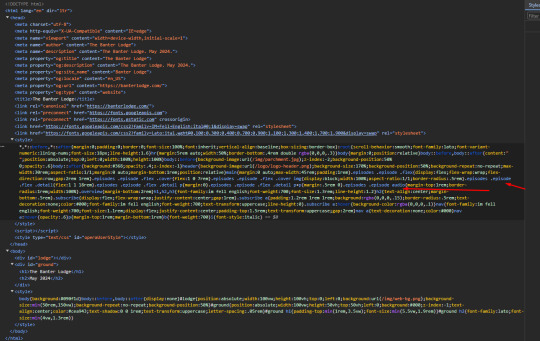
On May 1st Caprinae got this from the page. She also tweeted about it, after which the site changed to remove much of the css, including the part about the episodes and subscribe button. I was pretty excited about this as someone with a few years of coding experience, I wanted to mess around in VSC and see what I could find out.
After formatting the code the most noticeable thing is this right?
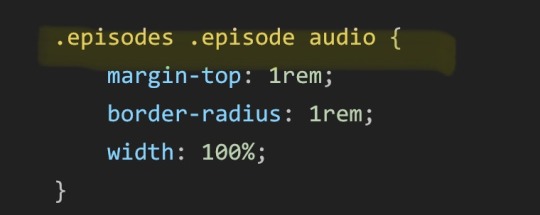
And when I make an element for it to apply to (since all that code is just formatting for stuff on the page like the title, images, etc, in this case- an audio bar) + adding in an image and an audio file:
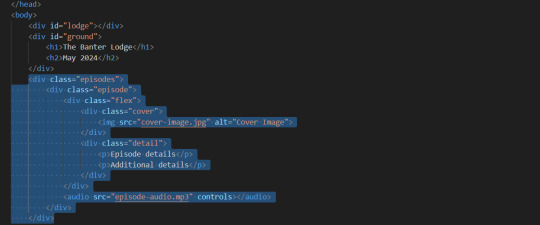
We get this
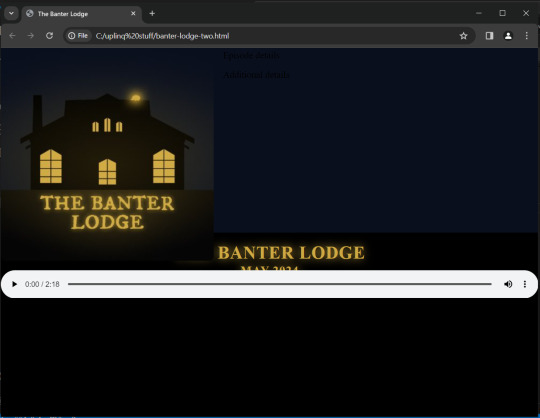
AUDIO and an image. It looks exactly like a podcast episode. It turns out there’s actually a bunch of code for formatting that’s not used in elements in the site (elements that exist: the title or image), but it’s there, so I made some elements it would apply to. technically, it’s supposed to have a parchment paper background too, but I just chose some colors that you could see the text on.
Doing so, we get this!

(Here’s a video version.)
Plus, Original Code and Modified Code if you’re curious
Anyway, so the site (at least at the stage the code was taken from) doesn’t appear to be finished and there was no Java script written (or at least, linked) but there is definitely the makings for a website for a podcast— some sort of nav bar with the episodes, on an episode page, the image and audio, and then a subscribe link at the bottom!
C. Purpose
Time to speculate on the real identity and purpose of the Banter Lodge. So far, we know it used to be called the Banther Lodge. We know it seems to be run by [insert here.] We know it is almost certainly a podcast of some sort. But what, and why?
Here are some possibilites:
1.Official Content to Tide Over Fans Til S6 As we know, to calm the frustration of fans at Netflix/TDP for the delay of S6, the creators have been putting out content every day for the fans to puzzle over and figure out the season six titles.
Based on the current schedule, it’s set to end on May 13.—although it could be ending either May 13 or May 14 (depending when they do the last hint) after these drop, there will likely be a lull in TDP content, which would be the perfect time for the Banter Lodge to launch.
+ The Banter Lodge teaser campaign has already been perfectly timed for when a bunch of fans would be online on Twitter checking in for clues to begin with.

If this is official content, it would doubly make sense—it’d be timed perfectly to tie the fans over until the actual season six campaign starts (ie, trailer). Considering these two fans also somehow got to have a private panel with the cast, it’s not impossible that they’d be working with TDP on this content, additionally the teaser images put out this far have been somewhat reminiscent of TDP official content—ie, Callum’s lodge notebook->Callum’s sketchbook, Refractions->Reflections, Dear Callum letter from Rayla, design style, etc.
However, there is one big reason I don’t think this is the case: it’s a little too sloppy. For example, if they wanted it to be completely anonymous and unclear what was happening, the tweet mentioning @‘BantherLodge’ in the panel would have been deleted and there wouldn’t have been any hints in the code. Of course, these could still just be honest mistakes. However, it also seems like it is building off of the current world in a more derivative, fan-content fashion, not necessarily adding new material the way TDP Official tends to. It’s copying the official style,—but almost too much if that makes sense.
Like altering a shot from the show for a teaser.


x
Don’t get me wrong. I love the way that they’re building off the world, I’m excited to see where it leads, but for whatever reason, to me, it just doesn’t seem official.
So assuming it’s made by fans, what kind of podcast is it? Second possibility—
2. Fan Made Talk Show
This seems like the most obvious conclusion, considering that The Banter House is a play on a location in TDP, and the word banter, which is synonymous with talking, but specifically back and forth, genial interactions.
Maybe it’s dedicated to analyzing the show or a particular aspect,—maybe centric to the lodge, crystals, Bait and Stella—maybe even interviewing cast/crew!
Well, to get a better idea of what niche it might be filling, let’s take a look at what TDP podcasts are already out there.
Hot Brown Morning Potion Podcast [2019-2023] Hosted by Tamika "Kuno" Williams and Hailey from Cartoon Universe. This podcast [is] full of answering fan questions, interviews, theories and all kinds of discussions on everything Dragon Prince.
News from the Breach [2020-2024] Your hosts Ceilidh and Yana are watching The Dragon Prince from start to finish. Each season of the podcast covers one “Book” (or season) of the Netflix series The Dragon Prince. In each episode we discuss two chapters of the series, except for the season finales.
Calm Chaos Club [2023] Join Kevlar and Lou each week as they discuss topics about animation, design, and all things related to The Dragon Prince on Netflix! With special guests brought on for unique topics and insights into the creative process, these bite-sized episodes will ensure you can get your TDP fix in anywhere and anytime.
There’s no harm in another talk show but as there are a few out there already (and for other reasons) I personally think this is not necessarily the niche the banter Lodge is going to fill. I mean, I do think that it’s still possible I mean, it could be centric to particular aspect around the lodge as mentioned.
However, there’s a possibility that excites me a lot more, that I’m hoping for the most….
3.Fan Made Audio Drama in the Saga Setting I have personally always been a huge fan of audio drama podcasts (TMA,TPP,WTNV) and if there was a dragon Prince audio drama podcast, I think I would just die on the spot honestly from joy. I also think it’s most likely because all of the clues so far have been very story/worldbuilding oriented, as well as writings from familiar characters’ perspectives. It seems as though a story is being crafted here, and I am all for it.
Y’know what? While we’re here on the topic of storytelling podcasts, we might as well throw in D&D/TTRPG or even Tales of Xadia as a possibility because yeah sure. Why not? I mean, tabletop role-play games also involve a lot of talking so it would fit the banter theme. Who knows.
That's all! What do you think? Any other thoughts, additions or other speculation? Feel free to add on!
Thanks to @bycaprinae for Twitter screenshots, html, and general inspiration, and to @parroset for other help with the website part and general support!
#tl;dr all evidence points to it being a fanmade podcast! Possibly launching May 15th!#CS Major core;#One of those things where I’m like. Should I post this#Well#I value…I promise the people freedom of information and so freedom of information is what they’re gonna get#This actually helped me learn/remember a lot of web design stuff haha#Yay#the dragon prince#tdp speculation#sort of#tdp meta
91 notes
·
View notes
Text
I don’t need the personalities in ur fic to be consistent with the source material but I do need chapter 2 & 17 to feel like the same character
#tylleethoughts#I have a fever and the only thing I’ve done for like 2 days is read this one fic and sleep#and then character a fucks up in a major way#like seriously fucks over character b#and character c (their supposed bestie) just doesn’t care???#like that shit is all forgiven now bc they’re back together?#two chapters ago character Cs heart was breaking over how A was treating B#that shit hasn’t been undone or worked through or even properly apologised for#FOUR CHAPTERS AGO U TALKED ABOUT HOW B JUST LETS THE PEOPLE HE LOVES USE HIM BUT I GUESS SINCE THEYRE OFFICIALLY BOYFRIENDS#AND NOT A SITUATIONSHIP ITS FINE????#she would not fucking SAY THAT#character A would be on such thin fucking ice#the narrative is acting like A & B we’re equally in the wrong#and I just cannot disagree more#C is like hypersensitive to the nuances of her friends emotions#she would not let this slide#don’t establish a characters core values/traits if ur just going to throw them out when it pleases ur romance#reading#I don’t have proper tags to sort anything on this blog but I’m working on it#I might have to dnf this
1 note
·
View note
Text
Many billionaires in tech bros warn about the dangerous of AI. It's pretty obviously not because of any legitimate concern that AI will take over. But why do they keep saying stuff like this then? Why do we keep on having this still fear of some kind of singularity style event that leads to machine takeover?
The possibility of a self-sufficient AI taking over in our lifetimes is... Basically nothing, if I'm being honest. I'm not an expert by any means, I've used ai powered tools in my biology research, and I'm somewhat familiar with both the limits and possibility of what current models have to offer.
I'm starting to think that the reason why billionaires in particular try to prop this fear up is because it distracts from the actual danger of ai: the fact that billionaires and tech mega corporations have access to data, processing power, and proprietary algorithms to manipulate information on mass and control the flow of human behavior. To an extent, AI models are a black box. But the companies making them still have control over what inputs they receive for training and analysis, what kind of outputs they generate, and what they have access to. They're still code. Just some of the logic is built on statistics from large datasets instead of being manually coded.
The more billionaires make AI fear seem like a science fiction concept related to conciousness, the more they can absolve themselves in the eyes of public from this. The sheer scale of the large model statistics they're using, as well as the scope of surveillance that led to this point, are plain to see, and I think that the companies responsible are trying to play a big distraction game.
Hell, we can see this in the very use of the term artificial intelligence. Obviously, what we call artificial intelligence is nothing like science fiction style AI. Terms like large statistics, large models, and hell, even just machine learning are far less hyperbolic about what these models are actually doing.
I don't know if your average Middle class tech bro is actively perpetuating this same thing consciously, but I think the reason why it's such an attractive idea for them is because it subtly inflates their ego. By treating AI as a mystical act of the creation, as trending towards sapience or consciousness, if modern AI is just the infant form of something grand, they get to feel more important about their role in the course of society. Admitting the actual use and the actual power of current artificial intelligence means admitting to themselves that they have been a tool of mega corporations and billionaires, and that they are not actually a major player in human evolution. None of us are, but it's tech bro arrogance that insists they must be.
Do most tech bros think this way? Not really. Most are just complict neolibs that don't think too hard about the consequences of their actions. But for the subset that do actually think this way, this arrogance is pretty core to their thinking.
Obviously this isn't really something I can prove, this is just my suspicion from interacting with a fair number of techbros and people outside of CS alike.
449 notes
·
View notes
Text
My autistic physical chemistry student (who also has tremors) study on Viper’s hands, or more specifically, her tremors and twitching and how it is most likely ruining her.
The “Incident” was, if not directly, a major contributor to the tremors. I’m going to (reasonably) assume her work with toxins and poisons is the main cause of the shaking. Her core abilities in game (and objectives in daily life and the war if we ignore the terrible game and see it world wise) revolve around controlling space and dealing damage where it’s needed.
Now, Toxic Screen and Poison Cloud creates an area of toxic gas that is meant to damage and obscure vision. This is a war, a very stressful and very tense war, morality and empathy are often forgotten under stress in soldiers when their life is on the line.
So, what would these hypothetical chemicals be?
- Sarin gas
A nerve agent that can obscure/blur vision. It disrupts the nervous system and leads to symptoms such as: Moisis (constricted pupils), eye pain, seizures, difficulty breathing.
Adding in the morality of Valorant and the fact she hasn’t seemingly gone completely insane, and assuming chemical warfare laws stand in the Valorant universe as they do here, using a nerve gas that is considered a war crime is a line I feel like Viper wouldn’t cross.
If she isn’t using a highly illegal gas, what could she be using? Maybe it’s simply CS gas (tear gas).
- Non-lethal
- Causes symptoms such as eye pain, lacrimation (tearing up), and respiratory irritation.
- Obscures vision and forces enemies to disperse/clear out of a site
- A little more ethically okay while still being effective
How is any of this relevant? If she is using something as harsh as a nerve gas, it would explain the tremors. Nerve agents work by inhibiting acetylcholinesterase (an enzyme that breaks down acetylcholine) leading to buildup of acetylcholine in nerve synapses. This excess acetylcholine overstimulates nerve cells which causes various symptoms including muscle twitching, weakness, and tremors. Working with this for years, even with PPE, would still do damage.
If she’s using something more civil such as CS gas, while hand tremors aren’t a commonly reported thing with CS exposure, there can and is still secondary effects of other neurological symptoms that might arise from exposure in either her lab or the field. CS often irritates the skin. In some cases, exposure can lead to more severe neurological symptoms including muscle weakness, numbness, and imbalance, which all potentially contribute to tremors.
Once again, how is this relevant?
Uncontrolled tremors often and will significantly impact one’s emotional well-being. They can lead to anxiety, depression, feelings of social embarrassment, affecting self-esteem and quality of life ect ect. The difficulty of simply functioning with tremors, especially when you’re a chemist working with very dangerous and deadly toxins and poisons all day, has to be god awful. Tremors affect the much simpler things such as eating, drinking, and writing which Viper does a lot of (both paperwork and experiments).
Depression caused from the tremors. Limitations imposed by tremors on daily activities and social interactions can lead to depression, depression leads to other emotions such as anger, anxiety, grief. Things along those lines. Stress Viper definitely doesn’t need in her already stressful life. Viper is so painfully alone and isolated. Having another agent see her tremors, seeing such a vulnerable part of herself definitely adds to her isolation. Locking herself in her lab for hours, days even, simply because of the tremors.
Shooting. Twitching or shaking hands and trying to hold and shoot a gun doesn’t go together very well. Despite this, once again choosing to put my mind into the lore wise world, Viper’s aim would be what I assume to be nearly perfect. Everything else about her is calculated and controlled, it’s assumption she’d pride her shot on being one of the best in the protocol. But as you could imagine, shaky hands would likely lead to missed shots on a few occasions. Despite her having shaky hands she stays calm and collected and can shoot with guns precisely, keeping her control and the show of being calculated around the others.
In conclusion, she definitely has what I would assume to be emotion driven tremors. Fear, guilt, discomfort and perhaps excitement are all adding to the shaking and twitching. Unfortunately I feel like any ounce of stress placed on the chemist would cause the tremors to worsen.
Going by her personality and way of processing things and reactions to situations, she’d definitely be the type of person to hit her hands off of her desk or lab bench in pure frustration at not being able to do an experiment or handle chemicals due to the tremors. Or in worse situations of panic and rage, I definitely think she’d try to break her hands if she got angry and desperate enough.
In conclusion again, she is definitely suffering with most likely very simple daily tasks on the bad days, and while they’re controlled as much as possible and hidden, it is still a contributor to her isolation and grief (and likely self hatred).
does any of that make any sense lol
#does any of this make sense#does anyone see my vision#ok guys just agree with me#shes so sad i want to put her in my pocket#i love her so much#sabine get behind me#viper valorant#sabine callas#valorant
39 notes
·
View notes
Text

he's dead
none of them would survive surfing in real life (except takeru). all these cs majors and not a single core muscle to be seen
#beach episode!!!#I need them to be friends so badly#imagine this as a post credit scene after some major character undeath#homura takeru#kogami ryoken#fujiki yusaku#their funky little designs have really grown on me#truly peak yugioh hair#yugioh vrains#ygo vrains#moonrise draws
11 notes
·
View notes
Note
bridgerton gojo is one of the most well written fics ive ever read! do you have any tips? ngl i wanna write fics but i struggle with narration
AHH thank you! honestly I’m surprised you want to ask ME about narration because i SUCK at it 💀 but regardless i will try my best and hope this helps:
i think you should flesh out what you want from a scene first. for bridgerton!gojo, the chapter 4 scene where gojo was practicing archery with yuji, my notes looked like
“basically gojo and yuji r doing archery bc gojo promised he would give him pointers, bc want yuji to favor gojo and be on his good side to see him like a role model. gojo is hot and sweaty, make sure to emphasize muscles and shi, reader is objective so she thinks he’s hot but hates him and conveys that to nobara who disaproves. nobara gives her advice like a friend to friend dynamic. gojo is very skilled etc etc and reader writes in her diary about how hot he is.”
my notes are actually a bit more incoherent than that but i digress. it’s about brain farting something. in writing, there are two fears: 1. fear of your plot not being coherent/things not connecting i.e. characters being OOC and 2. your tone of writing being bad. brain farting like this means disregarding number 2 and focusing on the character’s actions and characterization + the things you want readers to take away from this scene. THEN i write things to narrate that and what they’re doing in a way that it encapsulates those core ideas, and revisiting to polish what i wrote and my style because I don’t have to worry about my content anymore.
this might be a bit robotic but I’m a cs and math major anyways 😪 I applied to like 20 US colleges last year and had to write a gazillion essays so I’ve gotten rid of the notion of “writer’s block” and started to brain fart because that’s how you write college essays —- highlight traits about yourself and items on your resume through a narrative. it has changed how I write and idk if that’s a bad thing! will deffo be taking lots of creative writing classes in college haha
9 notes
·
View notes
Note
what's it like studying CS?? im pretty confused if i should choose CS as my major xx
hi there!
first, two "misconceptions" or maybe somewhat surprising things that I think are worth mentioning:
there really isn't that much "math" in the calculus/arithmetic sense*. I mostly remember doing lots of proofs. don't let not being a math wiz stop you from majoring in CS if you like CS
you can get by with surprisingly little programming - yeah you'll have programming assignments, but a degree program will teach you the theory and concepts for the most part (this is where universities will differ on the scale of theory vs. practice, but you'll always get a mix of both and it's important to learn both!)
*: there are some sub-fields where you actually do a Lot of math - machine learning and graphics programming will have you doing a lot of linear algebra, and I'm sure that there are plenty more that I don't remember at the moment. the point is that 1) if you're a bit afraid of math that's fine, you can still thrive in a CS degree but 2) if you love math or are willing to be brave there are a lot of cool things you can do!
I think the best way to get a good sense of what a major is like is to check out a sample degree plan from a university you're considering! here are some of the basic kinds of classes you'd be taking:
basic programming courses: you'll knock these out in your first year - once you know how to code and you have an in-depth understanding of the concepts, you now have a mental framework for the rest of your degree. and also once you learn one programming language, it's pretty easy to pick up another one, and you'll probably work in a handful of different languages throughout your degree.
discrete math/math for computer science courses: more courses that you'll take early on - this is mostly logic and learning to write proofs, and towards the end it just kind of becomes a bunch of semi-related math concepts that are useful in computing & problem solving. oh also I had to take a stats for CS course & a linear algebra course. oh and also calculus but that was mostly a university core requirement thing, I literally never really used it in my CS classes lol
data structures & algorithms: these are the big boys. stacks, queues, linked lists, trees, graphs, sorting algorithms, more complicated algorithms… if you're interviewing for a programming job, they will ask you data structures & algorithms questions. also this is where you learn to write smart, efficient code and solve problems. also this is where you learn which problems are proven to be unsolvable (or at least unsolvable in a reasonable amount of time) so you don't waste your time lol
courses on specific topics: operating systems, Linux/UNIX, circuits, databases, compilers, software engineering/design patterns, automata theory… some of these will be required, and then you'll get to pick some depending on what your interests are! I took cybersecurity-related courses but there really are so many different options!
In general I think CS is a really cool major that you can do a lot with. I realize this was pretty vague, so if you have any more questions feel free to send them my way! also I'm happy to talk more about specific classes/topics or if you just want an answer to "wtf is automata theory" lol
#asks#computer science#thank you for the ask!!! I love talking abt CS and this made me remember which courses I took lol#also side note I went to college at a public college in the US - things could be wildly different elsewhere idk#but these are the basics so I can't imagine other programs varying too widely??
10 notes
·
View notes
Text
@girderednerve replied to your post coming out on tumblr as someone whose taught "AI bootcamp" courses to middle school students AMA:
did they like it? what kinds of durable skills did you want them to walk away with? do you feel bullish on "AI"?
It was an extracurricular thing so the students were quite self-selecting and all were already interested in the topic or in doing well in the class. Probably what most interested me about the demographic of students taking the courses (they were online) was the number who were international students outside of the imperial core probably eventually looking to go abroad for college, like watching/participating in the cogs of brain drain.
I'm sure my perspective is influenced because my background is in statistics and not computer science. But I hope that they walked away with a greater understanding and familiarity with data and basic statistical concepts. Things like sample bias, types of data (categorical/quantitative/qualitative), correlation (and correlation not being causation), ways to plot and examine data. Lots of students weren't familiar before we started the course with like, what a csv file is/tabular data in general. I also tried to really emphasize that data doesn't appear in a vacuum and might not represent an "absolute truth" about the world and there are many many ways that data can become biased especially when its on topics where people's existing demographic biases are already influencing reality.
Maybe a bit tangential but there was a part of the course material that was teaching logistic regression using the example of lead pipes in flint, like, can you believe the water in this town was undrinkable until it got Fixed using the power of AI to Predict Where The Lead Pipes Would Be? it was definitely a trip to ask my students if they'd heard of the flint water crisis and none of them had. also obviously it was a trip for the course material to present the flint water crisis as something that got "fixed by AI". added in extra information for my students like, by the way this is actually still happening and was a major protest event especially due to the socioeconomic and racial demographics of flint.
Aside from that, python is a really useful general programming language so if any of the students go on to do any more CS stuff which is probably a decent chunk of them I'd hope that their coding problemsolving skills and familiarity with it would be improved.
do i feel bullish on "AI"? broad question. . . once again remember my disclaimer bias statement on how i have a stats degree but i definitely came away from after teaching classes on it feeling that a lot of machine learning is like if you repackaged statistics and replaced the theoretical/scientific aspects where you confirm that a certain model is appropriate for the data and test to see if it meets your assumptions with computational power via mass guessing and seeing if your mass guessing was accurate or not lol. as i mentioned in my tags i also really don't think things like linear regression which were getting taught as "AI" should be considered "ML" or "AI" anyways, but the larger issue there is that "AI" is a buzzy catchword that can really mean anything. i definitely think relatedly that there will be a bit of an AI bubble in that people are randomly applying AI to tasks that have no business getting done that way and they will eventually reap the pointlessness of these projects.
besides that though, i'm pretty frustrated with a lot of AI hysteria which assumes that anything that is labeled as "AI" must be evil/useless/bad and also which lacks any actual labor-based understanding of the evils of capitalism. . . like AI (as badly formed as I feel the term is) isn't just people writing chatGPT essays or whatever, it's also used for i.e. lots of cutting edge medical research. if insanely we are going to include "linear regression" as an AI thing that's probably half of social science research too. i occasionally use copilot or an LLM for my work which is in public health data affiliated with a university. last week i got driven batty by a post that was like conspiratorially speculating "spotify must have used AI for wrapped this year and thats why its so bad and also why it took a second longer to load, that was the ai generating everything behind the scenes." im saying this as someone who doesnt use spotify, 1) the ship on spotify using algorithms sailed like a decade ago, how do you think your weekly mixes are made? 2) like truly what is the alternative did you think that previously a guy from minnesota was doing your spotify wrapped for you ahead of time by hand like a fucking christmas elf and loading it personally into your account the night before so it would be ready for you? of course it did turned out that spotify had major layoffs so i think the culprit here is really understaffing.
like not to say that AI like can't have a deleterious effect on workers, like i literally know people who were fired through the logic that AI could be used to obviate their jobs. which usually turned out not to be true, but hasn't the goal of stretching more productivity from a single worker whether its effective or not been a central axiom of the capitalist project this whole time? i just don't think that this is spiritually different from retail ceos discovering that they could chronically understaff all of their stores.
2 notes
·
View notes
Text
Review: O Kadhal Kanmani
Originally posted elsewhere on 16th April 2015
Disclaimer: I'm an unqualified reviewer. For a list of people who are qualified to write about OK Kanamani, please consult Suhasini Maniratnam

Despite how old you've gotten watching Mani Ratnam, the excitement of watching his next never diminishes. Especially, when the movie works - part experience and part nostalgia. OK Kanmani is as simple as Mani Ratnam gets and as profound as any of his classic films on love. No non-linear timelines, no metaphors, no value judgements and no message, just a straight love story from the Mani Ratnam we thought we'd lost.
Yes, OK Kanmani is going to be branded by many as an update on 'Alaipayuthe'. While there's superficial merits to parallels, any such comparison is missing a larger point. OK Kanmani is an affirmation that love endures anything, even the age of instant gratification, fleeting relationships and self-centered ambitions. A reassurance that love, like an stubborn virus evolves and trumps even the most testing environments.
Many filmmakers find the divisions in an ever-changing India. Mani Ratnam finds his in the grind between a conservative past and the liberal ideas of the present. O Kadhal Kanmani balances a society that holds its nose to anything unconventional against the attitudes of millennials for whom living together is a convenience and signing up for a commitment is a shallow formality - an after-thought.
Aadi (Dulquer Salman) and Tara (Nithya Menen) rush into an open relationship and a live-in arrangement with no intent of settling down. Her architect scholarship's about to take her to Paris; his gaming-dev skills have currency in the US. Can their casual, time-boxed courtship fall turn into a commitment they both dread and declare taboo? Sounds very time-worn and ripe for sentimental pickings. Mani Ratnam, of course, dresses it up with his unwavering sense of aesthetics and his insane level of insight into the Gen Y's mind.
For multitudes of us, falling in love or cherishing the feeling of love is a brief high, a phase of life that we leave behind, in our rush to get on with the challenges and rigours our life; not for Mani Ratnam. He is that rare director who can lead you back into that corner of your heart that once used to throb with the excitement of living the moments of love. His comfort with dealing a romance can give any young or even semi-seasoned (uh hmm, GVM) director a complex.
Mani Ratnam's been repeating his rule on casting for decades now - "50% of the film is casting". Although, at times we've felt he doesn't follow his own advice. Not with OKK. There are four primary characters and each one of them pivots the story with maturity and confidence. Prakash Raj, Nithya Menen & Dulquer (in that order) light up the screen with such familiarity and freshness, like regular folks plucked from their living rooms, their pajamas still on. Prakash Raj's hamming could have been a major problem 'cause he shoulders a sizable portion of the movie and is the emotional core of OKK. He's in a league of his own here - a completely winsome performer.
Rahman's presence in a Mani Ratnam film cannot be anything along expected lines. As with all Mani Ratnamm movies, none of the songs you've heard going into the movie remain the same (shortened, remixed and reimagined) and there's the on-screen-exclusive thukda songs that are used aplenty here too. Waiting to get my hands on the background classical-funky fusion track (Kalyani's theme), in particular.
As if to mock folks calling out Mani's pattern of using of trains and stations, almost every scene features a loco compartment. The opening scene, staged on the platforms of Mumbai's CS terminus is a kicker, Mani goes one better on his usually impressive starting sequence. Mani and PC Sriram put on a show that reminds us why people still whistle to title cards bearing their names. Same with the rain too - no shying away from them, plenty of emotions drained and drenched under it. The MR-PC combination pulls off magical moments on screen that should lay to rest any claims to "next Mani Ratnam" or "next PC Sriram".
OK Kanmani
3 notes
·
View notes
Text
Nothing like feeling you're finally stabilizing your finances after years of scraping by, only to get flashbanged on a random transition advice discord by a trans woman 3 years younger than you making more money in tech than the fucking VP of the R&D division in your multinational company's core office.
Goddamn it I should've gone into tech like half the entire transfem population of this country apparently did. I almost majored in CS, I was this close. I picked a different STEM major, and I'm doing OK finally, but fuck me I chose poorly.
0 notes
Text
Why Study Computer Science and Engineering (AI & ML) in Hyderabad, and What Are the Benefits?

Choosing a specialization in Computer Science and Engineering (AI & ML) in Hyderabad is becoming an increasingly popular choice among students aspiring to enter the world of advanced technology and innovation. But why Hyderabad? And what makes this specialization such an attractive option? Let’s explore these questions in depth.
Why AI & ML are Reshaping the World
Artificial Intelligence (AI) and Machine Learning (ML) are among the fastest-growing fields globally. AI is transforming everything from healthcare diagnostics and autonomous vehicles to smart assistants and personalized marketing. Machine Learning, a crucial subset of AI, focuses on developing systems that learn and improve from data without being explicitly programmed.
Together, these fields form the backbone of the technologies we use daily and are at the center of innovations driving Industry 4.0.
Why Hyderabad is a Top Destination for AI & ML Education
Hyderabad has rapidly emerged as one of India’s major technology hubs, often referred to as “Cyberabad” due to its thriving IT and tech ecosystem. Here’s why this city stands out for students pursuing Computer Science and Engineering (AI & ML):
1) Presence of Top Tech Companies and Startups
Hyderabad is home to global tech giants such as Microsoft, Google, Amazon, Facebook, and Apple, all of which have significant research and development centers here. Additionally, there’s a growing number of AI and data-driven startups focusing on fields such as healthcare, fintech, agritech, and cybersecurity.
Studying AI & ML in Hyderabad means being close to these companies, which increases internship opportunities, industry exposure, and chances of placement in leading firms.
2) Quality Educational Institutions
Colleges like HITAM (Hyderabad Institute of Technology and Management) have designed specialized programs in Computer Science and Engineering with a focus on AI & ML. These programs blend foundational CS concepts with advanced courses in neural networks, natural language processing, data analytics, and deep learning.
At HITAM, for instance, the curriculum is developed in collaboration with industry experts, ensuring that students graduate with skills that match current industry needs.
3) Strong Industry-Academia Collaboration
Institutions in Hyderabad frequently partner with tech companies to bring real-world projects into the classroom. This helps bridge the gap between theory and practice. Students work on live projects, participate in hackathons, and attend guest lectures by data scientists and AI engineers.
Such experiences build both technical and soft skills, preparing students for professional challenges from day one.
4) Vibrant Innovation and Entrepreneurship Ecosystem
Hyderabad hosts T-Hub, one of India’s largest innovation hubs, as well as several incubators and accelerators dedicated to emerging technologies. Students in AI & ML programs often get the opportunity to pitch ideas, build prototypes, and launch startups during or after their studies.
Being part of this ecosystem sparks creativity and encourages practical learning.
What You Study in Computer Science and Engineering (AI & ML)
A typical undergraduate program in this specialization includes:
Core CS subjects: Data structures, algorithms, operating systems, databases, networks, etc.
AI & ML modules: Deep learning, reinforcement learning, computer vision, natural language processing, data analytics, and probabilistic models.
Practical labs and projects: Students work on real data, build models, and evaluate performance.
Ethics and AI: Understanding the societal and ethical implications of AI systems.
By graduation, students will have gained experience in designing, training, and deploying machine learning models, giving them a competitive edge in the job market.
Benefits of Choosing This Specialization in Hyderabad
Industry readiness: Hyderabad’s educational institutions align their courses with the needs of the local and global tech industry, producing graduates who can immediately contribute to AI and ML projects.
Career opportunities: Graduates can become AI engineers, machine learning engineers, data scientists, NLP specialists, computer vision engineers, or research analysts. The demand for these roles in Hyderabad’s tech ecosystem is rapidly growing.
Networking: Hyderabad hosts numerous AI and data science meetups, conferences, and workshops. Participating helps students build connections that often lead to internships or job offers.
Exposure to real-world challenges: By working on projects for local companies or startups, students learn to apply AI & ML solutions to real business problems, adding strong projects to their portfolios.
Focus On Holistic Development at Institutions like HITAM
HITAM stands out not only for its technical curriculum but also for its focus on holistic student development. Here’s how:
Project-based learning: Encourages practical problem-solving.
Research opportunities: Students can engage in AI research, publish papers, and present their findings at conferences.
Ethics and social impact: Emphasizing how AI should be designed responsibly to benefit society.
Soft skills training: Communication, teamwork, and leadership, which are critical for success in the AI industry.
This balanced approach ensures students aren’t just technically proficient but also well-rounded professionals.
Long-Term Benefits of Studying AI & ML
High salaries and career growth: AI professionals often command higher starting salaries and enjoy opportunities for rapid career advancement.
Diverse industries: Skills are applicable in healthcare, finance, education, transportation, and more.
Global opportunities: AI and ML are in demand worldwide.
Continuous learning: The field is constantly evolving, making it an intellectually stimulating environment.
Conclusion
Studying Computer Science and Engineering (with a focus on AI & ML) in Hyderabad offers the perfect blend of an advanced curriculum, strong industry connections, a thriving innovation ecosystem, and global opportunities. Institutes like HITAM ensure students graduate with not just theoretical knowledge, but also practical skills and an ethical mindset.
For those passionate about shaping the future of technology and making a real-world impact, this specialization in a city like Hyderabad is an excellent choice. To explore further details, course structure, and admissions, you can visit: https://hitam.org/.
In the age of AI, choosing the right specialization and city can truly shape your career, and Hyderabad, with its dynamic tech culture and academic excellence, makes that journey even more promising.
0 notes
Text
Top CS Engineering Colleges in Jaipur – Why SGVU is the Best Choice
Jaipur, the education capital of Rajasthan, has become a top destination for engineering aspirants. Among all the engineering streams, Computer Science Engineering (CSE) is the most sought-after due to the rising demand for skilled professionals in the IT and tech industry. If you’re searching for the best CS engineering college in Jaipur, Suresh Gyan Vihar University (SGVU) stands out as a clear leader in offering industry-focused education, modern infrastructure, and outstanding placement opportunities.
SGVU offers a future-ready B.Tech program in Computer Science Engineering that is designed to meet the ever-evolving needs of the digital world. The curriculum covers core computer science subjects like programming, algorithms, data structures, and software engineering, along with advanced topics such as Artificial Intelligence, Machine Learning, Data Science, Cybersecurity, Cloud Computing, and Blockchain Technology. SGVU ensures that students are not only well-versed in theory but also gain practical experience through projects, coding labs, and industry interaction.
One of the strongest reasons why SGVU is considered the best CS engineering college in Jaipur is its consistent placement record. The university’s dedicated placement cell works actively with top IT companies like Infosys, Wipro, TCS, Capgemini, IBM, Tech Mahindra, and many startups to ensure students receive internships and job offers. SGVU also conducts regular mock interviews, aptitude training, coding bootcamps, and resume workshops to make students industry-ready.
SGVU’s faculty is another major strength. The university is home to experienced professors and industry experts who are passionate about teaching and guiding students. Many of them are researchers, PhD holders, and professionals who bring real-world knowledge into the classroom, helping students understand concepts with clarity and depth.
The infrastructure at SGVU is top-notch, with smart classrooms, high-speed internet, advanced computer labs, innovation centers, and access to cloud-based learning platforms. The university also fosters a startup-friendly ecosystem where students are encouraged to work on innovative projects, participate in hackathons, and explore entrepreneurship.
Moreover, SGVU offers opportunities for global exposure through collaborations with international universities and online certification programs. Students can enroll in value-added courses in Python, Java, Full Stack Development, and Artificial Intelligence to further enhance their skill set and career prospects.
In addition to academics, SGVU ensures a vibrant campus life with various clubs, technical fests, workshops, seminars, and personality development programs. This holistic approach helps students grow both personally and professionally.
In conclusion, if you’re looking for a top CS engineering college in Jaipur, Suresh Gyan Vihar University is undoubtedly the best choice. With its industry-aligned curriculum, experienced faculty, strong placement support, and focus on innovation, SGVU offers everything a Computer Science Engineering student needs to succeed in the competitive tech world.
0 notes
Text
Medical Education in the USA: Courses, Duration, and Career Prospects
Medical education in the United States is considered one of the most prestigious and rigorous in the world. With cutting-edge research, state-of-the-art facilities, and a commitment to producing highly competent physicians, the U.S. medical education system attracts thousands of domestic and international students every year.
Becoming a doctor in the USA is a lengthy and challenging process that requires dedication, academic excellence, and a passion for medicine. This guide offers a deep dive into the structure of medical education in the U.S., including the types of courses available, their duration, requirements, and the career opportunities available upon completion.
Overview of Medical Education in the USA
Medical education in the United States typically involves the following stages:
Undergraduate Education (Pre-Med) – 4 years
Medical School – 4 years
Residency Training – 3 to 7 years
Fellowship (optional, for specialization) – 1 to 3 years
This multi-tiered structure ensures that aspiring doctors receive comprehensive training, both in theoretical knowledge and practical clinical skills.
Pre-Medical Education (Undergraduate Studies)
What is Pre-Med?
"Pre-med" is not a specific major but a track that includes all the necessary courses required for admission to medical school. Students typically pursue a 4-year bachelor's degree while completing pre-med coursework.
Common Majors for Pre-Med Students
Biology
Chemistry
Biochemistry
Neuroscience
Psychology
Health Sciences
However, students can major in any field, provided they complete the prerequisite science courses required by medical schools.
Pre-Med Coursework Includes:
General Biology with Lab
General Chemistry with Lab
Organic Chemistry with Lab
Physics with Lab
English Composition
Mathematics (Calculus and/or Statistics)
Biochemistry (increasingly required)
Social Sciences (e.g., Psychology, Sociology)
MCAT: The Gateway Exam
The Medical College Admission Test (MCAT) is a standardized, multiple-choice exam required for medical school admission. It tests knowledge in biology, chemistry, physics, psychology, critical thinking, and reading comprehension.
A competitive MCAT score is crucial for gaining admission to top medical schools.
Medical School: The Core of Medical Education
Duration: 4 Years
Medical school is where students gain in-depth knowledge of medical science and develop clinical skills. It is divided into two phases:
Phase 1: Pre-Clinical Years (Years 1-2)
These first two years focus on basic sciences and foundational medical knowledge.
Subjects include:
Anatomy
Physiology
Biochemistry
Microbiology
Pharmacology
Pathology
Behavioral Sciences
Medical Ethics
Some medical schools use a systems-based approach, integrating subjects around organ systems like the cardiovascular or respiratory systems.
Hands-on components include:
Cadaver dissection
Clinical skills training
Simulation labs
Problem-based learning
Phase 2: Clinical Years (Years 3-4)
These two years involve clinical rotations (clerkships) in various specialties at affiliated hospitals.
Core rotations include:
Internal Medicine
Surgery
Pediatrics
Obstetrics & Gynecology
Psychiatry
Family Medicine
Neurology
Students work with doctors and patients, apply theoretical knowledge, and explore potential career paths.
Licensing Exams During Medical School
Medical students must pass the United States Medical Licensing Examination (USMLE) series:
USMLE Step 1: After 2nd year; assesses basic sciences
USMLE Step 2 CK (Clinical Knowledge): During 4th year; evaluates clinical knowledge
Some also take USMLE Step 2 CS (Clinical Skills), although it was discontinued in 2021.
Residency Training
After earning a Doctor of Medicine (MD) or Doctor of Osteopathic Medicine (DO) degree, graduates must complete residency training in their chosen specialty.
Residency Application Process
Students apply through the National Resident Matching Program (NRMP). Applications include:
USMLE scores
Letters of recommendation
Medical school transcripts
Personal statement
Interview performance
Residency Duration by Specialty
Family Medicine: 3 years
Internal Medicine: 3 years
Pediatrics: 3 years
General Surgery: 5 years
Neurosurgery: 7 years
Orthopedic Surgery: 5 years
Dermatology: 4 years
Psychiatry: 4 years
Emergency Medicine: 3–4 years
Residents receive a stipend and work under supervision in hospitals, gaining hands-on experience.
Fellowship Training (Optional)
After residency, physicians may choose to subspecialize by pursuing a fellowship.
Examples of Fellowships:
Cardiology (after Internal Medicine) – 3 years
Gastroenterology – 3 years
Pulmonary and Critical Care Medicine – 2–3 years
Surgical Oncology – 2 years
Neonatology – 3 years
Interventional Radiology – 1–2 years
Fellowships offer deeper expertise and increase earning potential.
Licensing and Board Certification
State Licensure
To legally practice medicine in the USA, doctors must obtain a state medical license. Each state has its own licensing board and requirements, but passing the USMLE is universally required.
Board Certification
After completing residency (and sometimes fellowship), doctors may become board-certified in their specialty by passing exams from relevant boards such as:
American Board of Internal Medicine (ABIM)
American Board of Surgery (ABS)
American Board of Pediatrics (ABP)
Board certification enhances credibility and employment opportunities.
Types of Medical Degrees in the USA
Doctor of Medicine (MD)
Granted by allopathic medical schools. Focuses on conventional medical practices using drugs and surgery.
Doctor of Osteopathic Medicine (DO)
Granted by osteopathic medical schools. DOs receive the same training as MDs but also learn osteopathic manipulative treatment (OMT).
DOs can specialize in any field, practice in all 50 states, and take the USMLE exams. They also take the COMLEX-USA, an alternative licensing exam.
Career Prospects After Medical Education
Employment Opportunities
U.S. medical graduates have a wide range of career opportunities, including:
Hospitals
Private Practices
Academic Institutions
Research Centers
Public Health Organizations
Government Agencies (e.g., CDC, NIH)
Global Health NGOs
Telemedicine Platforms
High-Demand Specialties
Some specialties are in high demand due to physician shortages and aging populations:
Primary Care (Family Medicine, Internal Medicine, Pediatrics)
Psychiatry
Geriatrics
Emergency Medicine
General Surgery
Average Salaries by Specialty (approximate)
Family Medicine: $230,000/year
Internal Medicine: $260,000/year
Pediatrics: $220,000/year
Psychiatry: $275,000/year
Emergency Medicine: $350,000/year
General Surgery: $400,000/year
Cardiology: $500,000+/year
Orthopedic Surgery: $600,000+/year
Salaries depend on location, experience, employer type, and subspecialization.
International Medical Graduates (IMGs)
Many international students aspire to become doctors in the USA. However, they must meet several requirements:
IMG Requirements:
Graduate from a World Directory of Medical Schools-listed institution
Pass USMLE Step 1 and Step 2 CK
Obtain ECFMG (Educational Commission for Foreign Medical Graduates) certification
Secure a residency position via NRMP Match
Challenges for IMGs:
Intense competition for residency spots
Preference for U.S. clinical experience
Visa restrictions
Yet, thousands of IMGs successfully enter U.S. residency programs every year, especially in primary care fields.
Financial Considerations
Medical School Tuition
Medical education in the USA is expensive. The average tuition and fees per year:
Public Medical Schools (in-state): $35,000–$45,000
Public Medical Schools (out-of-state): $55,000–$65,000
Private Medical Schools: $60,000–$75,000+
Total Cost Over 4 Years:
$200,000 to $350,000+ (including living expenses)
Financial Aid Options:
Federal and private student loans
Scholarships and grants
Service-based programs (e.g., NHSC, military service)
Many graduates incur debt, but high earning potential and loan forgiveness programs help mitigate this burden.
Trends and Innovations in Medical Education
Technological Advancements
Virtual simulations and AI-assisted learning
Online anatomy labs
Interactive case-based modules
Curriculum Reform
Accelerated 3-year MD programs
Integrated clinical exposure from Year 1
Greater emphasis on public health and health equity
Diversity and Inclusion
Medical schools are actively working to increase representation of underrepresented minorities in medicine.
Global Health and Telemedicine
Curricula increasingly include global health electives and telehealth training, preparing future doctors for modern challenges.
Conclusion
Medical education in the USA is a long but rewarding journey marked by academic excellence, clinical training, and personal growth. From the undergraduate level through residency and beyond, the process equips aspiring physicians with the knowledge and skills to make a lasting impact on individual lives and the broader healthcare system.
Despite the high costs and intense competition, the career prospects for medical professionals in the U.S. remain strong. With high demand for healthcare providers, especially in underserved areas and primary care specialties, the future remains bright for those committed to the path of medicine.
Whether you’re a domestic student considering the pre-med track or an international student dreaming of a career in the U.S. healthcare system, understanding the structure, requirements, and opportunities of medical education in the USA is the first crucial step toward your goal.
1 note
·
View note
Text
Choosing the Right Course After Class 12
The end of Class 12 marks a major milestone in every student’s life. It’s a turning point — a time filled with hope, ambition, and sometimes confusion. With so many career options and courses available today, choosing the right course after 12th can feel overwhelming.
But don’t worry. The key lies in understanding your interests, exploring opportunities, and making an informed decision.
Here’s a complete guide to help you make the right choice.
Start with Self-Reflection
Before jumping into course lists or college rankings, take a step back and ask yourself:
What subjects do I enjoy studying?
What are my strengths?
What type of career appeals to me?
Do I want a creative job, a technical role, or something people-oriented?
Understanding your own interests and personality is the first step toward finding a career that suits you — not just now, but for the long term.
Understand the Streams and Their Options
Science Stream (PCM / PCB)
If you took the Science stream in Class 12, you have a wide range of career options:
Engineering (B.Tech/B.E.): For students with PCM (Physics, Chemistry, Maths), with specializations like Computer Science, Mechanical, Civil, AI, etc.
Medical (MBBS, BDS, BAMS): For students with PCB (Physics, Chemistry, Biology).
Pure Sciences (B.Sc.): Physics, Chemistry, Biology, Maths, Environmental Science, etc.
Other options: Biotechnology, Pharmacy, Agriculture, Forensic Science, Data Science, and more.

Commerce Stream
For students with a commerce background, there are strong options across business, finance, and law:
B.Com / BBA: Ideal for careers in business, marketing, HR, or entrepreneurship.
CA / CS / CMA: Professional courses for those aiming for core finance and accounting roles.
Economics / Statistics / Finance: For those interested in research, analytics, or the financial sector.
Law (5-year Integrated LLB): A growing and well-respected career option post-12th commerce.
Arts/Humanities Stream
If you studied humanities, you have creative and impactful career paths available:
B.A. (English, History, Political Science, Psychology, etc.): For careers in civil services, education, content, etc.
Journalism and Mass Communication: For those interested in media and storytelling.
Design & Fine Arts: Fashion, Interior, Product Design, etc.
Law / Social Work / Hotel Management / Event Management: All great options depending on your interests.
Emerging & Professional Courses After 12th
Apart from the traditional options, several new-age and trending careers are now in high demand:
BCA / B.Sc. in Computer Science or Data Science
Bachelor’s in Design (B.Des) – UI/UX, Fashion, Product
Bachelor of Hotel Management (BHM)
Bachelor of Mass Media (BMM)
Digital Marketing & Content Creation Courses
Animation, Game Design, and Film Studies
These courses are often skill-based and lead directly to industry roles, especially in tech, design, and creative fields.
Factors to Consider While Choosing a Course
1. Interest and Passion
Choose a course that aligns with what excites you. If you enjoy what you study, success becomes easier.
2. Career Opportunities
Explore the job roles, salary potential, and long-term growth of the career linked to the course.
3. Course Duration and Structure
Some courses are 3 years, others are 4-5 years. Consider the time, syllabus, and learning style involved.
4. Affordability and ROI
Check the cost of the course, college fees, and future return on investment.
5. College or University Reputation
Research the best institutions offering your chosen course. Rankings, placements, and faculty matter.
Seek Guidance, but Decide for Yourself
It’s good to take advice from parents, teachers, or mentors — but the final decision should be based on your goals and clarity. Don’t choose a course just because it’s trending or your friends are doing it.
Explore online resources, talk to students already in the course, attend webinars, and look at career outcomes. The more you know, the more confident you’ll feel.
Final Thoughts
Choosing the right course after Class 12 is not about following a fixed path — it’s about creating one that matches your strengths and dreams. Whether you pick engineering, design, business, or arts, what matters most is how committed and curious you are to grow in that field.
Take your time, research well, and trust your instincts. Your career journey begins here — make it count.
#ScienceStream#CommerceStudents#ArtsStream#EngineeringAspirants#MedicalEntrance#DesignCareers#BBAAdmissions#BComCareer#LawAfter12th#CreativeCourses
1 note
·
View note
Text
Top 10 Engineering Colleges in Haryana for Future Engineers

Introduction
Are you on the hunt for the best engineering colleges in Haryana to launch your career? You're not alone, and you’re in luck! Haryana is quickly becoming one of India’s emerging education hubs, especially for engineering aspirants.
From centrally-funded institutions to private universities with international collaborations, Haryana’s got a wide range of options for budding engineers. This guide dives into the top 10 engineering colleges in Haryana, highlighting what makes each one special, be it world-class infrastructure, top-tier faculty, or unmatched placement records.
Let’s explore what’s out there and help you make an informed choice that fits your goals.
1. JMIT Radaur – A Legacy of Excellence
Overview
JMIT, short for Seth Jai Parkash Mukand Lal Institute of Engineering and Technology, has consistently ranked among the top engineering colleges in Haryana. Affiliated with Kurukshetra University and approved by AICTE, JMIT has built a solid reputation.
Courses Offered
B.Tech (CSE, ECE, ME, IT, AI & ML)
M.Tech
MBA, MCA
Campus Facilities
Smart classrooms
Central library with 60,000+ books
Wi-Fi enabled hostel
Robotics & Innovation Labs
Industry Connect & Placement
JMIT has built strong relationships with recruiters like Infosys, TCS, Wipro, Capgemini, and Amazon. They also run regular soft-skills training and internships.
Why Choose JMIT?
If you're looking for quality education with practical exposure, JMIT offers the right blend of academics, co-curriculars, and career readiness.
2. NIT Kurukshetra – National Prestige
Overview
A centrally-funded institution, NIT Kurukshetra is one of India’s top engineering colleges and a dream college for many.
Research and Innovation Focus
Funded research by DRDO, ISRO
Multiple patents filed yearly
Incubation cell for startups
Infrastructure Highlights
Central Computer Lab
Dedicated Engineering Departments
Sports Complex & Auditorium
Campus Life
With cultural fests, robotics competitions, and coding marathons, life here is vibrant and intellectually stimulating.
Placement Overview
Average placement packages often exceed ₹10 LPA, especially for CS & ECE.
3. UIET, Kurukshetra University
Background
Established under Kurukshetra University, UIET provides affordable and high-quality engineering education.
Academic Programs
B.Tech in core and emerging streams
Dual Degree Programs
Labs & Learning Tools
Well-equipped labs in mechanical, electrical, and civil departments make UIET stand out.
Industry Collaborations
MOUs with major Indian companies for internships and industrial training.
Notable Alumni
UIET alumni are placed in PSU jobs and global MNCs alike.
4. YMCA University, Faridabad
University Profile
YMCAUST is now officially a university and offers a wide range of B.Tech programs.
Key Departments
Computer Engineering
Electrical & Electronics
Mechanical Engineering
Academic Excellence
Known for rigorous academics and practical approach.
Research Labs and Facilities
IoT & Embedded Systems Lab
Advanced CAD Centre
Career Opportunities
Great track record of placements in Core Engineering, IT, and Consulting.
5. DCRUST, Murthal
Institution Overview
Deenbandhu Chhotu Ram University of Science and Technology is a state university and a go-to choice for engineering in northern Haryana.
Accreditation & Rankings
NAAC ‘A’ Grade
Strong NIRF Rankings in the state
Student Support Systems
Mentorship programs, student chapters of IEEE, and GATE coaching support.
Placement & Training
Recruiters include Maruti Suzuki, Indian Oil, L&T, and Infosys.
Why DCRUST is Future-Ready
Focus on clean energy, sustainability, and AI research makes it a modern choice.
6. Amity University, Gurugram
Private University Snapshot
A UGC-recognized private university known for top-notch infrastructure.
Advanced Curriculum
Industry-ready programs with a focus on practical applications.
International Collaborations
Foreign internships
Student exchange with 30+ universities
Student Life & Hostel Facilities
Modern hostels, sports complexes, and cultural clubs.
Industry-Oriented Approach
Internship programs with IBM, Microsoft, and HCL.
7. BML Munjal University
Vision and Mission
Backed by the Hero Group, BML emphasizes on experiential learning.
Interdisciplinary Focus
Students work on real-world problems, across disciplines.
Entrepreneurial Culture
Incubation and Startup funding programs are part of the curriculum.
Facilities and Mentoring
Guidance from global faculty and in-house mentors.
Career Prospects
Excellent internships and placement support in tech giants.
8. Manav Rachna International Institute of Research and Studies
Overview
One of the oldest private universities with engineering excellence.
Centers of Excellence
In-house SAP, AutoCAD, and AI labs in partnership with industry.
Skill-Based Learning
Regular workshops, certification programs, and hackathons.
International Exposure
Study Abroad programs in Dubai, USA, UK.
Corporate Tie-Ups
Tech Mahindra, Accenture, and IBM recruit from here.
9. NorthCap University, Gurugram
About the University
A tech-forward, student-centric private university.
Project-Based Learning
Hands-on learning and research from Day 1.
Placement Insights
91%+ students placed in the last 3 years.
Life on Campus
A blend of academics, tech fests, sports, and community service.
Future Plans
More international tie-ups and AI-focused programs.
10. Panipat Institute of Engineering & Technology (PIET)
College Overview
One of the fastest-growing private colleges in Haryana.
Strong Industrial Linkages
Associations with industry leaders for internships and projects.
Academic and Non-Academic Ecosystem
From sports tournaments to technical symposiums, student life is vibrant.
Placement Record
Strong in Mechanical, Civil, and IT engineering placements.
Why PIET is a Top Pick
Affordable fees and high placement ratio make it a value-for-money choice.
Comparison List of Top 10 Engineering Colleges in Haryana
1. NIT Kurukshetra
NIRF Ranking: Top 50
Fees (Approx/Year): ₹1.25 Lakh
Average Placement: ₹10 LPA
2. JMIT Radaur
NIRF Ranking: Not Available
Fees (Approx/Year): ₹90,000
Average Placement: ₹4.5 LPA
3. UIET, Kurukshetra University
NIRF Ranking: Not Available
Fees (Approx/Year): ₹75,000
Average Placement: ₹3.5 LPA
4. YMCA University, Faridabad (YMCAUST)
NIRF Ranking: 101–150
Fees (Approx/Year): ₹1 Lakh
Average Placement: ₹4.2 LPA
5. DCRUST, Murthal
NIRF Ranking: Not Available
Fees (Approx/Year): ₹70,000
Average Placement: ₹3.8 LPA
6. Amity University, Gurugram
NIRF Ranking: Not Available
Fees (Approx/Year): ₹1.8 Lakh
Average Placement: ₹5 LPA
7. BML Munjal University
NIRF Ranking: Not Available
Fees (Approx/Year): ₹2.2 Lakh
Average Placement: ₹6.5 LPA
8. Manav Rachna International Institute of Research and Studies (MRIIRS)
NIRF Ranking: Not Available
Fees (Approx/Year): ₹1.5 Lakh
Average Placement: ₹4 LPA
9. NorthCap University, Gurugram
NIRF Ranking: Not Available
Fees (Approx/Year): ₹1.9 Lakh
Average Placement: ₹4.5 LPA
10. Panipat Institute of Engineering & Technology (PIET)
NIRF Ranking: Not Available
Fees (Approx/Year): ₹1 Lakh
Average Placement: ₹3.8 LPA
Things to Consider When Choosing Engineering Colleges in Haryana
Accreditation (AICTE/UGC/NAAC)
Campus Placement support
Practical exposure opportunities
Hostel and safety facilities
Budget and ROI
FAQs
1. What are the eligibility criteria for engineering colleges in Haryana?
Ans: Most require 10+2 with Physics, Chemistry, and Math with a minimum of 45-50% and JEE Main scores.
2. Which is the most affordable engineering college in Haryana?
Ans: JMIT and DCRUST offer quality education at affordable fees.
3. How do placements compare across public vs. private institutions in Haryana?
Ans: Public institutions like NIT offer better average salaries, but top private universities also offer good packages.
4. Can I get hostel facilities in engineering colleges in Haryana?
Ans: Yes, all top colleges offer hostel facilities with modern amenities.
5. Which engineering branch has the best scope currently?
Ans: CSE, AI & ML, and JMIT are currently in high demand.
Conclusion
So there you have it, our handpicked list of the top 10 engineering colleges in Haryana. Whether you're looking for affordable education, research opportunities, or corporate exposure, there's a college on this list that's perfect for you.
Take time to explore, visit campuses if you can, and talk to alumni. Remember, the right college can truly set the stage for a fulfilling engineering career.
0 notes
Text
Choosing Your Academic Path: A Guide to Streams, Subjects, and Their Career Links
Choosing Your Academic Path: A Guide to Streams, Subjects, and Their Career Links (Focusing on the Indian Education System)
Choosing what subjects to study after your 10th standard (or equivalent) in India is a major decision. It can feel like you're standing at a crossroads, with different paths stretching out before you. Your choices here will significantly influence the career options available to you later.
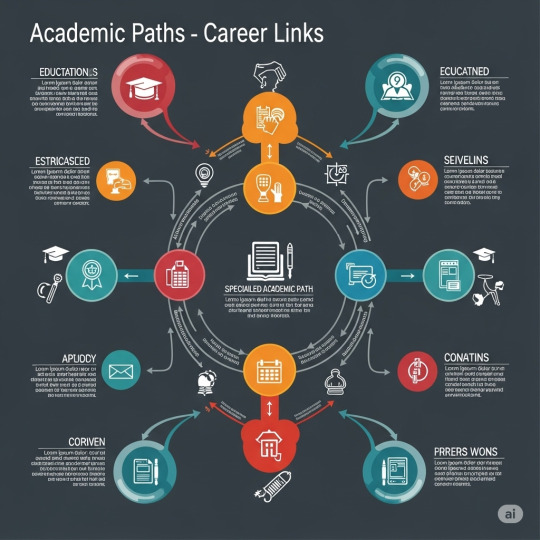
At Youth Career Institute, we understand the importance of making an informed decision. This guide will walk you through the main academic streams in the Indian education system (primarily CBSE and State Boards), the key subjects within them, and the potential career links they offer. Let's navigate these paths together!
Understanding the Main Academic Streams
After completing your 10th standard, you'll generally need to choose one of the following streams for your 11th and 12th grades:
Science Stream: Often perceived as the gateway to technical and medical professions, the Science stream typically includes subjects like Physics, Chemistry, Biology (or Biotechnology), and Mathematics. You'll also usually have the option of an elective subject like Computer Science, Economics, or English.
Commerce Stream: This stream focuses on business, finance, and economics. Core subjects usually include Accountancy, Business Studies, Economics, and Mathematics (or an alternative like Informatics Practices). Elective options might include subjects like English, Legal Studies, or Entrepreneurship.
Arts (or Humanities) Stream: This stream encompasses a wide range of subjects related to social sciences, humanities, and languages. Common subjects include History, Political Science, Geography, Economics, English (or other languages), Sociology, Psychology, Philosophy, and more. The specific combinations can vary widely between boards and schools.
Exploring Key Subjects and Their Career Connections
Let's delve deeper into the core subjects within each stream and the types of careers they can lead to:
Science Stream
Physics: The study of matter, energy, and their interactions.
Career Links: Engineering (various branches like Mechanical, Electrical, Civil, Aerospace), Physics Research, Astronomy, Meteorology, Geophysics, Data Science, Software Development.
Chemistry: The study of the composition, properties, and reactions of matter.
Career Links: Chemical Engineering, Pharmacy, Medicine (through NEET), Biochemistry, Materials Science, Forensic Science, Environmental Science, Research and Development.
Biology (or Biotechnology): The study of living organisms and their processes. Biotechnology applies biological principles to create products and technologies.
Career Links: Medicine (through NEET), Dentistry, Pharmacy, Nursing, Biotechnology, Microbiology, Genetic Engineering, Biomedical Engineering, Agricultural Science, Environmental Science, Research.
Mathematics: The study of numbers, patterns, structures, and change.
Career Links: Engineering (all branches), Computer Science, Data Science, Actuarial Science, Finance, Economics, Statistics, Research, Teaching.
Computer Science/Informatics Practices: Focuses on the principles and application of computer systems and software.
Career Links: Software Development, Web Development, Data Science, Cybersecurity, Artificial Intelligence, Game Development, IT Management.
Commerce Stream
Accountancy: The practice of recording, classifying, and summarizing financial transactions.
Career Links: Chartered Accountancy (CA), Company Secretary (CS), Cost and Management Accountancy (CMA), Accountant, Auditor, Finance Manager, Investment Banking.
Business Studies: An introduction to the principles of business organization, management, and operations.
Career Links: Business Management, Marketing, Human Resources, Sales, Entrepreneurship, Retail Management, Operations Management.
Economics: The study of how societies allocate scarce resources.
Career Links: Economist, Financial Analyst, Banking, Insurance, Public Policy, Market Research, Civil Services, Teaching.
Mathematics/Informatics Practices: (As described in the Science stream, these subjects offer analytical and technical skills valuable in commerce-related fields).
Career Links (in Commerce): Finance, Data Analysis, Actuarial Science, Business Analytics.
Arts (or Humanities) Stream
History: The study of past events and their significance.
Career Links: Historian, Archaeologist, Museum Curator, Archivist, Journalist, Civil Services, Teaching, Heritage Management.
Political Science: The study of political systems, theories, and behavior.
Career Links: Civil Services, Journalism, Law, Political Analyst, International Relations, Public Policy, Teaching.
Geography: The study of the Earth's physical features, human populations, and their interactions.
Career Links: Urban Planning, Environmental Management, Cartography, Geographic Information Systems (GIS), Tourism, Disaster Management, Civil Services, Teaching.
Economics: (As described in the Commerce stream, Economics is also a popular and valuable subject in Arts).
Career Links: Economist, Civil Services, Journalism, Research, Public Policy.
English/Other Languages: The study of literature, grammar, and communication skills.
Career Links: Journalism, Content Writing, Translation, Interpretation, Teaching, Public Relations, Advertising, Literature, Linguistics.
Sociology: The study of society, social interaction, and social institutions.
Career Links: Social Worker, Counselor, Human Resources, Market Research, Civil Services, Teaching.
Psychology: The study of the human mind and behavior.
Career Links: Psychologist, Counselor, Therapist, Human Resources, Research, Marketing.
Philosophy: The study of fundamental questions about existence, knowledge, values, reason, mind, and language.
Career Links: Law, Journalism, Civil Services, Research, Teaching, Ethics Consulting.
Making the Right Choice for You
Choosing your academic path is a personal journey. Consider the following factors:
Your Interests: What subjects do you genuinely enjoy learning? You're more likely to succeed and stay motivated in areas that interest you.
Your Aptitude: What are you naturally good at? Consider your strengths in subjects like math, science, language, or analytical thinking.
Your Career Aspirations (Even if Tentative): While your first choice isn't set in stone, having some career ideas in mind can help you select a relevant stream. Research different careers and the educational qualifications they typically require.
Guidance from Teachers and Counselors: Talk to your teachers, school counselors, and career advisors at institutes like Youth Career Institute. They can provide valuable insights and help you understand the implications of your choices.
Don't Just Follow the Crowd: Choose a stream based on your own interests and abilities, not just because your friends are doing it or because of perceived social status.
Navigating these choices can feel overwhelming, but you don't have to do it alone.
At Youth Career Institute, we offer personalized career counseling to help students like you understand your strengths, explore different career options, and make informed decisions about your academic path.
Reach out to us today for guidance on choosing the right stream and subjects for a bright future!
0 notes